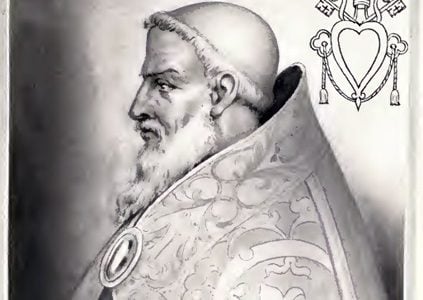
Pope Honorius I (Public Domain Image)
Pope Honorius I (625-638) is a favorite example among anti-Catholic Protestants who wish to dispute the doctrine of papal infallibility. (See here for an example, from our old friend Dr.* James White.) Of late, some Catholics have picked up on this, seemingly in an effort to lay groundwork for the claim that Pope Francis teaches heresy. “Why, popes have taught heresy before!” they will say. “The Third Council of Constantinople condemned Pope Honorius I. Don’t you know that? He accepted the Monothelite error.” Thus do Catholics, in a zeal of Pope Francis Derangement Syndrome, begin to sound like Protestants who reject the papacy, and the Church, altogether.
***
Monothelitism is a Christological heresy. It is the view that Christ, though he has two natures (human and divine), has only one will (a divine will). The Third Council of Constantinpole formally declared this to be a heresy in 681, forty-three years after the death of Honorius I.
And as we recognize two natures, so also we recognize two natural wills and two natural operations. For we dare not say that either of the natures which are in Christ in his incarnation is without a will and operation: lest in taking away the proprieties of those natures, we likewise take away the natures of which they are the proprieties.
In other words, if you take away Christ’s human will, you take away his human nature along with it. But the problem, for our purpose, is in what the Council says next:
[W]e cast out of the Church and rightly subject to anathema all superfluous novelties as well as their inventors: to wit, Theodore of Pharan, Sergius and Paul, Pyrrhus, and Peter (who were archbishops of Constantinople), moreover Cyrus, who bore the priesthood of Alexandria, and with them Honorius, who was the ruler (πρόεδρον) of Rome, as he followed them in these things.
So the council did condemn Honorius. I will return to that. For now, though, I take you back several years before the Council. Monothelitism arose in the 630s as an attempt to compromise with another heresy. That one was the Monophysite heresy. (It is easy to mix up your mono with your mono, but bear with me.) Monophysites taught that Christ had only one nature, a divine one; they had been in schism from Rome for around two hundred years.
At the time, the patriarch of Constantinople was Sergius I. Perhaps with the best intentions, he wanted to reconcile the Monophysites with Rome; and so he proposed that Christ had two natures but only one will. He calculated this might be acceptable to the Monophysites if he could get the pope to agree. Of course, orthodox Catholics knew that any such doctrine was no less than a denial of the fullness of Christ’s human nature. But Sergius attempted to force the issue by writing two letters about it to Honorius. In them, he suggested to the pope that to teach that Christ had two wills would lead people to presume that those wills were opposed to each other. And the Son can not be opposed to the Father. (That part, at least, is true.)
At Catholic Answers, Robert Spencer comments:
Sergius was trying a little sleight of hand: He was attempting to deny the existence of Christ’s human will by pointing out that our Lord never opposed the Father. Yet if two persons agree, they may be spoken of as being of “one will” this doesn’t mean, of course, that one of them has no will at all.
In reply, Honorius, as the Catholic Encyclopedia explains, made no “dogmatic decision.” He “did not decide the question, did not authoritatively declare the faith of the Roman Church, did not claim to speak with the voice of Peter.” He “condemned nothing” and “defined nothing.” However, he agreed with Sergius that it was best to avoid any talk of “two operations” in Christ, lest anyone speak of opposing wills. At that point, Honorius added the key words:
Wherefore we acknowledge one Will of our Lord Jesus Christ, for evidently it was our nature and not the sin in it which was assumed by the Godhead, that is to say, the nature which was created before sin, not the nature which was vitiated by sin.
The Catholic Encyclopedia is right, I think, when it insists that we can not dismiss this as a mere “private letter”; Honorius wrote in response to a formal request. The key question is how we are to understand the pope’s words. The Monothelites, to be sure, made much of them and quoted them in support of their doctrine.
Mr. Spencer at Catholic Answers, however, takes a different view:
[A] look at Honorius’ exact words shows that while he did use a formula—“one will”—that was later declared heretical, he used it in a sense that implied the orthodox belief.
That is, the context of the pope’s reply was Sergius’s suggestion that Christ is not opposed to the Father. Honorius meant to defend that truth—that Christ’s wills are not in opposition. He phrased it in an inexact way, but that is what he was getting at.
And in fact, as Mr. Spencer points out, this was the understanding of Honorius’s first successor, Pope John IV. In his reply, “Honorius assumed the existence of a human will in Christ by saying that his nature is like humanity’s before the Fall.” If Honorius had meant to accept the doctrine that Christ only had a divine will, he could not have made such a comparison. That is how John IV understood it.
The Council, though, did not agree. But funny thing about councils: They have no authority unless the pope confirms what they decree. In the case of the Council’s condemnation of Honorius for heresy, Pope Leo II did not.
(An interesting footnote of papal history: During the council, the pope was St. Agatho. It so happened he died just as the Council was completing its work. One can only speculate whether he would have accepted the Council’s judgment on Honorius.)
As for Leo II, he condemned Honorius, instead, because he “permitted the immaculate faith to be subverted.” That is to say (as the New Catholic Encyclopedia says), Honorius was negligent in combatting the heresy. But he did not subscribe to the heresy, still less did he teach it.
Some try to claim that Honorius was listed among the heretics by the Trullan synod. The older Catholic Encyclopedia, in its article on Honorius, is among them. “He was a heretic,” the encyclopedia says. (The New Encyclopedia disagrees.), What the Old does not mention is that the pope at the time (692 A.D.), St. Sergius I, refused to ratify it. He said he would “rather die than consent to erroneous novelties.” The Trullan Synod (also known as the Quinisext Council) thus has no authority in the Church, and never did. How odd that the Old Encyclopedia leaves out this important detail.
Some also point to the condemnation of Honorius was included in an oath that every new pope had to swear until the eleventh century. (The oath is in the Liber diurnus.) However, the oath scorns Honorius only in that he “added fuel” to the “wicked assertions” of the Monothelites. We already knew this, for that was what Leo II said. But the sense of it is that Honorius was negligent, not heretical.
Honorius’s words were used by the Monothelites in defense of their doctrine, but the words were in another context. Honorius meant to deny that Christ’s will was opposed to the Father’s, not to assert that Christ only had a divine will.
Honorius was no heretic, and did not teach heresy.











